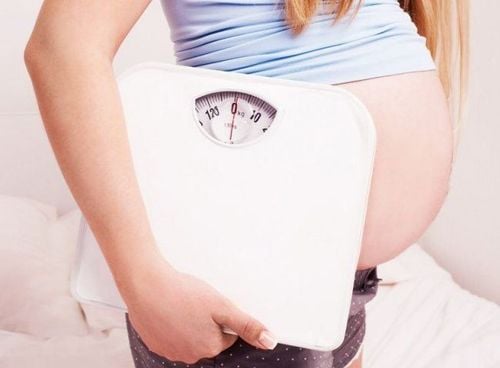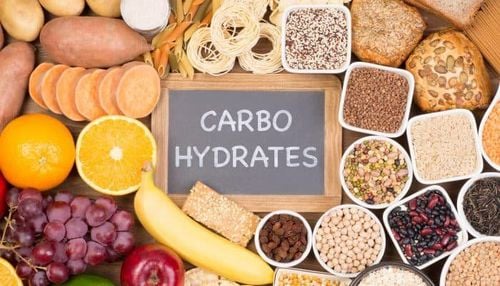This is an automatically translated article.
Child's weight index is the top concern of all parents, the weight will change with each age and most accurately reflect the nutritional status of the child. Six months of age is also the period when the baby begins to get used to the process of weaning, so what should a 6-month-old baby eat to gain weight?
1. What is the baby's weight at 6 months?
Before choosing solid foods for a 6-month-old baby or learning about what 6-month-old children should eat to gain weight, parents need to determine where their child's weight index is currently. Based on the data provided from the table of height and weight standards according to the World Health Organization (WHO), the weight of a 6-month-old baby will be divided according to each level, belonging to each different sex:
For 6-month-old boys: The standard weight of the baby needs to achieve is 7.9kg. Meanwhile, if the child weighs less than 6.4 kg at an age, it is called malnourished and the child is classified as a child at risk of malnutrition when his weight is less than 7.1 kg. Similarly for girls, the standard weight of a 6-month-old baby is 7.3kg, if the baby weighs less than 5.8kg, it is called malnourished and the baby will have a high risk of malnutrition when the weight is less than 6, 4kg. Watch now: Types of weaning foods for babies 6 months
2. What should 6-month-old babies eat to gain weight?
If the child does not reach the standard weight at this age, what parents are very concerned about is what a 6-month-old child eats to gain weight and how to build solid foods for a 6-month-old baby. and best for you.

Giải đáp trẻ 6 tháng ăn gì để tăng cân
2.1. Milk is still the main source of nutrition for 6-month-old babies
Parents should note that for children under 1 year old, milk is the main food for children, not a solid food. The main source of nutrition children receive for development before 1 year of age is from milk, children only receive a very small part of nutrition from solid foods.
When the baby is 6 - 9 months old is the time when the baby is getting used to food, so the recommended amount of food for the child is very little because the baby's body needs time to get used to it. Parents should not be too obsessed with what their 6-month-old baby eats to gain weight because the baby can eat very little, this will not affect the nutrition that the baby receives if the baby still drinks full milk.
According to the Japanese method of weaning, for children from 6-9 months, the amount of solid food should only account for 30% of the child's nutritional resources. Specifically, the recommended amount of food is about 100ml per day, only equal to about 1 cup of porridge with ingredients such as:
Porridge: 50-80ml; Vegetables: 20-30ml; Protein: 10-15ml. If parents only focus on the issue of what their 6-month-old baby should eat but forget about milk supply or give the baby less milk, it is completely wrong, which not only makes the baby unable to gain weight but also can lead to nutritional deficiencies if drinking too little milk. Children 6 months old still need to continue to breastfeed or replace milk 3-5 times a day, cow's milk should not be given to children under 1 year old.
Most babies from 6-12 months gain weight slowly because they have started to be more active, like to talk and explore things around more than eating. In the first 6 months of life, babies are very sedentary and explore, so they have accumulated a lot of energy for the next period of development, so parents do not need to worry too much. because this can also cause damage to the child's digestive system, making the child anorexic, forming a fear of eating.
Watch now: Note when giving 6-month-old baby solids
2.2. Baby food for 6 months baby
This is the phase of getting used to solid foods, so after the baby has been tried many different types of cereal, parents can begin to test the child's tolerance to tubers, Fresh fruit is stewed, should try 1 type / time, then wait 2-3 days to check if an allergic condition appears or not. Should start with common vegetables such as: green beans, potatoes, carrots, sweet potatoes, pumpkins, beets... and fruits like: bananas, apples, peaches, melons... consider the amount of fruit and berries when feeding your baby, besides that the consistency of the food can be increased gradually.
Weaning foods for 6-month-old babies need to be processed into a liquid and soft form so that children can swallow and digest them easily. Nutritional ingredients should be selected so that the balance between groups of carbohydrates, proteins, fats, fiber, vitamins and minerals. The important nutrients that should be in the porridge for babies at 6 months are: calcium, iron, vitamins A/C/D, Omega 3 fatty acids from foods such as:
Grains: use wholemeal flour cups to cook thin porridge or use ready-made cereals; Protein: use meat broth to cook porridge, then can be replaced with pureed meat including beef, pork, chicken, fish, shrimp, egg yolk...; Fat: Besides fat from meats, parents can add 1 teaspoon of vegetable oil to flour or porridge; Fiber: add vegetables and fruits to snacks, with soft fruits that can be mashed for children, hard fruits that can be juiced to drink, and vegetables that should be pureed and mixed with porridge for added color, flavor and nutrition. However, breast milk is still the main source of nutrition for 6-month-old babies who want to gain weight.

Thực phẩm ăn dặm cho bé 6 tháng tăng cân cần chế biến thành dạng lỏng
3. Note when preparing weaning foods for 6-month-old babies to gain weight
When preparing solid foods for 6-month-old babies, parents should pay attention to the following issues:
Do not add cold water while cooking porridge: because cold water can cause rice grains to swell, nutrition is lost. dissolving, taking longer to cook and reducing the delicious taste of porridge; Parents should only cook a quantity of porridge suitable for the strength of their 6-month-old baby, do not cook too much or reheat several times a day. No seasoning: Parents or caregivers of children should not add seasoning to weaning foods for 6 months old because at this time the baby's body is still not fully developed to absorb salt, on the other hand, the amount of salt in the baby It is very small (1-2g salt/day) that breast milk is available and suitable for the needs of the baby's body. Adding a lot of spices when starting solid foods can cause kidney damage and create bad eating habits when children grow up. Instead, parents can use natural spices such as ginger, cinnamon, mint, pepper, and garlic in moderation. Do not defrost food with hot water or leave it at room temperature because it will create conditions for bacteria to grow, spoil food, easy poisoning and diarrhea when eaten, in addition to making nutrients evaporate. reduced freshness. Parents should defrost by putting it in the refrigerator, although it takes a long time, it keeps the freshness of the food. Children 6 months old is the time to start to enter the weaning stage, but for children under 1 year old, the main food is still milk. Therefore, parents need to pay attention to building a nutritious diet for their children so that children can develop comprehensively.
In addition, parents also need to pay attention to supplementing necessary micronutrients for children such as: Selenium, Chromium, Vitamins B1 and B6, Ginger, acerola fruit extract (vitamin C),... Especially zinc biology to improve taste, help children eat well, reach the correct height and weight, and exceed standards, have a good immune system, strengthen resistance to reduce minor illnesses and have fewer digestive problems.
For more nutritional knowledge and child care for each age, parents should regularly visit the website vimec.com and make an appointment with the leading doctors, pediatric and nutrition experts of the National General Hospital. Vinmec when needing advice on children's health.













